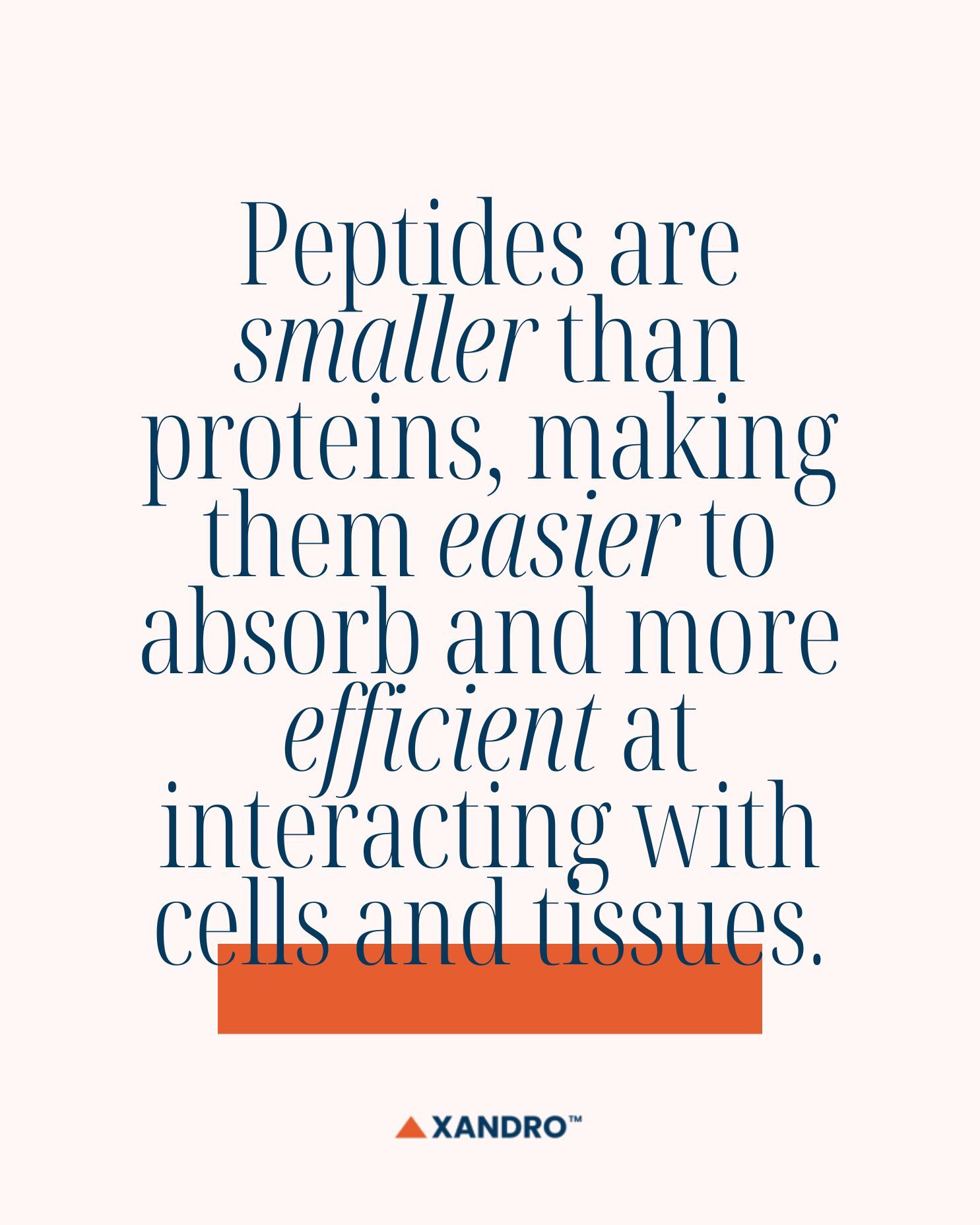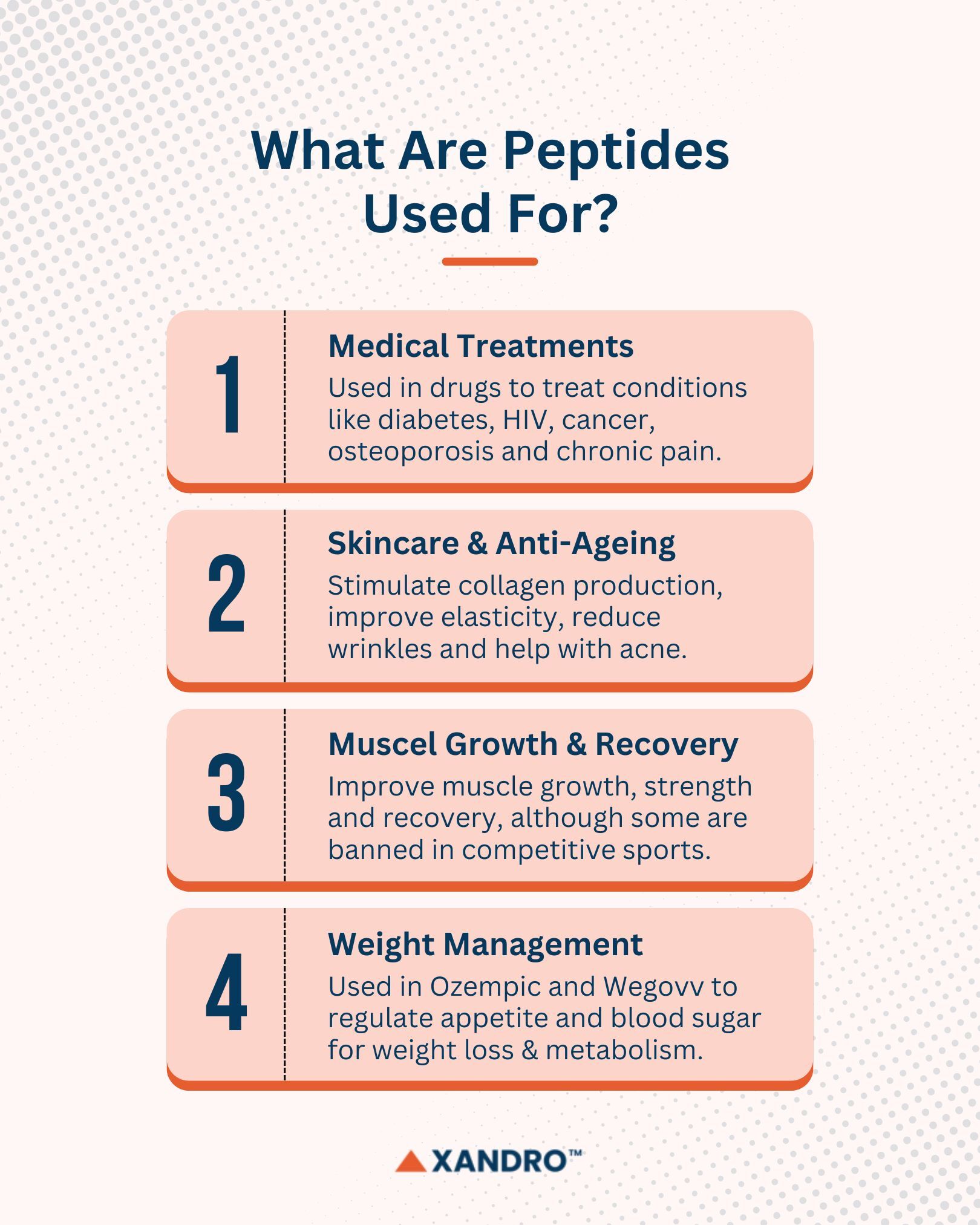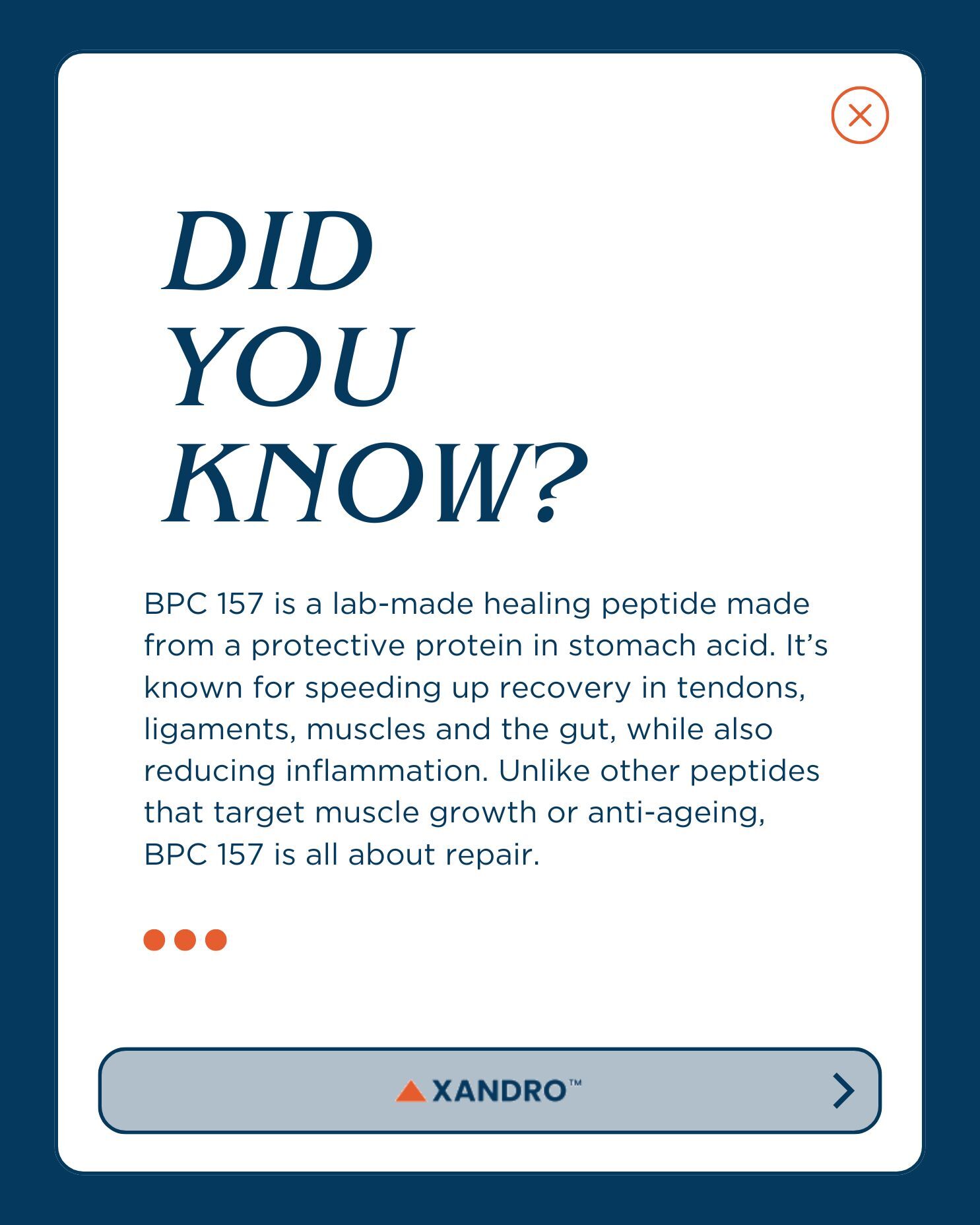What Are Peptides Used For? Benefits, Uses, Side Effects & Natural Sources
2nd Jul 2025
What Are Peptides? Your Guide to Their Benefits, Uses & Side Effects
Peptides are short chains of amino acids that act as messengers in your body, influencing muscle growth, fat loss, skin health and healing. Peptides are often used for fitness, weight management and skincare, but how do they work and do they have any downsides?
Let’s go over some questions. Know what you’re looking for? Jump there now!
- What Are Peptides?
- What Are Peptides Used For?
- What Do Peptides Do in the Body?
- What Are Peptides for Bodybuilding?
- What Are Peptides for Weight Loss?
- What Are Peptides for Skin?
- What Are Peptides BPC 157?
- Is there a Downside to Taking Peptides?
- What Foods are High in Peptides?
What Are Peptides?
Peptides are small chains of amino acids, which are the fundamental building blocks of proteins. While proteins are made up of long, complex chains of amino acids, peptides are much shorter, typically being made up of 2 to 100 amino acids. Because of their smaller size, peptides are more easily absorbed by the body compared to full-length proteins, allowing them to interact with cells and tissues more efficiently.
Your body naturally produces many different peptides, each serving unique functions. For example, insulin, a well-known peptide hormone, helps regulate blood sugar by allowing cells to absorb glucose for energy. Another example is collagen peptides, which support skin elasticity, joint health and bone strength.
Scientists have also developed synthetic peptides in laboratories for medical and cosmetic purposes. The first synthetic peptide, insulin, was created in 1921 and has been used to treat diabetes since 1923. Today, peptides are used in medications, skincare products and dietary supplements due to their ability to target specific biological processes with precision.

What Are Peptides Used For?
Peptides have a wide range of applications in medicine, skincare, fitness and nutrition. Some of the common uses of peptides include:
Medical Treatments
Peptides are used in over 100 FDA-approved drugs to treat conditions such as:
- Diabetes (e.g., liraglutide, semaglutide)
- Osteoporosis (e.g., teriparatide)
- Chronic pain (e.g., ziconotide)
- HIV (e.g., enfuvirtide)
- Cancer (e.g., carfilzomib for multiple myeloma)
Because peptides can be designed to interact with specific receptors in the body, they often have fewer side effects than traditional drugs.
Skincare & Anti-Ageing
Peptides like collagen and copper peptides (GHK-Cu) are popular in anti-ageing skincare products because they help stimulate collagen production, improve skin elasticity and reduce wrinkles. Some peptides also have antimicrobial properties, helping with acne and wound healing.
Further Reading: Our Top 15 Anti-Aging Supplements
Muscle Growth & Recovery
Certain peptides, such as creatine peptides and growth hormone secretagogues (GHS), are used by athletes and bodybuilders to improve muscle growth, strength and recovery. However, some performance-enhancing peptides are banned in competitive sports due to potential health risks.
Weight Management
Peptides like semaglutide (used in Ozempic and Wegovy) help regulate appetite and blood sugar, making them effective for weight loss and metabolic health.
Hair Growth
Peptides such as GHK-Cu and keratin-derived peptides are used in serums and supplements to promote thicker, healthier hair.
Bone Health
Collagen peptides have been shown to improve bone density, particularly in postmenopausal women, reducing the risk of osteoporosis.

What Do Peptides Do in the Body?
Peptides play important roles in many biological processes, acting as messengers, hormones and structural components. Some key functions include:
- Hormone Regulation: Peptides like insulin and glucagon help control blood sugar levels, while others like gonadotropin-releasing hormone (GnRH) influence testosterone production.
- Immune Defense: Antimicrobial peptides (AMPs) help fight infections by attacking harmful bacteria and viruses.
- Skin Repair: Collagen peptides maintain skin firmness, while others help heal wounds and reduce inflammation in conditions like eczema and psoriasis.
- Muscle and Tissue Repair: Peptides signal muscle growth and recovery after exercise by stimulating growth hormone release.
- Brain Function: Some peptides act as neurotransmitters, affecting mood, pain perception and cognitive function.
Because peptides are so versatile, researchers continue to explore new ways to use them in medicine and wellness. While some peptide supplements show promise, not all claims are backed by strong scientific evidence. Always speak with your doctor before using peptide-based treatments or supplements.
What Are Peptides for Bodybuilding?
In bodybuilding, certain peptides, particularly growth hormone secretagogues (GHS), are used to stimulate the production of human growth hormone (HGH), which plays a large role in muscle development, recovery and fat metabolism.
How Peptides Work for Muscle Growth
Some peptides, like GHRP-6, ipamorelin and CJC-1295, trigger the pituitary gland to release more HGH. This, in turn, increases insulin-like growth factor-1 (IGF-1), a hormone that encourages muscle protein creation and fat breakdown. Unlike synthetic anabolic steroids, which directly alter hormone levels, peptides work more naturally by enhancing the body’s hormone production.
Peptides vs. Steroids: Key Differences
- Structure & Mechanism:
- Peptides are amino acid chains that signal the body to produce more growth hormone naturally.
- Steroids are synthetic derivatives of testosterone that directly increase muscle mass but can disrupt natural hormone production.
- Side Effects:
- Peptides generally have fewer side effects since they work with the body’s natural processes. Possible side effects include temporary water retention, increased hunger (with GHRP-6), or insulin resistance if misused.
- Steroids can cause severe side effects like liver damage, testosterone suppression, acne, hair loss and mood swings.
- Legality and Bans:
- Many muscle-building peptides (like GHS) are banned by the World Anti-Doping Agency (WADA) for competitive athletes.
- Steroids are controlled substances and illegal without a prescription.
While peptides may offer a safer alternative to steroids for some, their muscle-building effects are less dramatic and require proper diet and training to see results.
Further Reading: Does Muscle Help with Longevity?
What Are Peptides for Weight Loss?
Certain peptides help with fat loss by influencing metabolism, appetite and insulin sensitivity. The most well-known weight-loss peptides include:
1. Semaglutide (Wegovy, Ozempic)
- Originally developed for type 2 diabetes, semaglutide reduces appetite by slowing digestion and increasing feelings of fullness.
- It mimics GLP-1, a hormone that regulates blood sugar and hunger.
- Studies show significant weight loss in users, making it a popular (but prescription-only) option.
2. Tesamorelin
- Stimulates growth hormone release, which helps burn stubborn fat (especially abdominal fat).
- Used medically for HIV-related lipodystrophy but sometimes taken off-label for fat loss.
3. AOD-9604
- A modified fragment of HGH that targets fat cells without affecting blood sugar or muscle growth.
- Some research suggests it helps with localised fat loss, but the evidence is mixed.
Note that while some peptides show promise for weight loss, many are not FDA-approved for this use and improper dosing can lead to side effects like nausea, insulin resistance, or hormone imbalances. Always speak with your doctor before using peptide therapies.
Further Reading: Do Cold Plunges Help You Lose Weight?
What Are Peptides for Skin?
Peptides are widely used in skincare for their ability to stimulate collagen, improve elasticity and repair damage. With weeks to months of consistent use, the most effective peptides for skin include:
1. Collagen Peptides
- Found in oral supplements and creams, these short chains of amino acids help boost skin hydration and elasticity.
- Studies show they can reduce wrinkles and improve skin texture, especially in people over 30.
2. Copper Peptides (GHK-Cu)
- Promote collagen and elastin production, helping with wrinkles, wound healing and skin firmness.
- Also act as antioxidants, protecting against free radical damage.
- Found in serums and creams, but injectable forms were banned by the FDA in 2023 due to safety concerns.
3. Matrixyl (Palmitoyl Pentapeptide-4)
- A synthetic peptide that signals skin to produce more collagen, reducing fine lines and improving texture.
- Common in anti-ageing creams.
4. Antimicrobial Peptides (AMPs)
- Naturally found in skin, these peptides fight bacteria and reduce inflammation.
- Help with acne, eczema and wound healing. Some prescription creams contain AMPs for skin conditions.
What Are Peptides BPC 157?
BPC 157 (Body Protection Compound-157) is a synthetic peptide that comes from a protective protein found in stomach acid. It has gained attention for its remarkable healing properties, particularly in repairing tendons, ligaments, muscles and the gut lining. Unlike many peptides that focus on muscle growth or anti-ageing, BPC 157 is mainly used for tissue repair and reducing inflammation.
How BPC 157 Works
- Accelerates Healing: Studies suggest BPC 157 helps with faster recovery from injuries by increasing blood flow to damaged tissues and stimulating collagen production.
- Reduces Inflammation: It helps calm chronic inflammation, making it useful for conditions like tendonitis, arthritis and inflammatory bowel disease (IBD).
- Protects the Gut: BPC 157 may strengthen the intestinal lining, helping with leaky gut syndrome and ulcers.
- Repairs Joints and Muscles: Athletes use it to recover from sprains, tears and post-surgery healing.
BPC 157 is typically taken as an injection near the injury site or orally for gut-related benefits. While research is promising, it’s not yet FDA-approved, so it’s often used off-label or in research settings.
Learn more about BPC 157 here.

Is there a Downside to Taking Peptides?
While peptides are generally considered safer than many drugs, they aren’t risk-free. Potential downsides include:
1. Side Effects
- Allergic reactions (rash, swelling, breathing difficulties)
- Digestive issues (nausea, diarrhea)
- Hormonal imbalances (if overusing growth-related peptides)
- Increased blood sugar or blood pressure (with certain peptides like GHRPs)
2. Lack of Regulation
- Many peptide supplements aren’t FDA-approved, meaning quality and purity vary. Some products may contain contaminants or incorrect dosages.
- Injectable peptides (like BPC 157 or GHS) are often sold as ‘research chemicals,’ meaning they aren’t officially approved for human use.
3. Banned in Sports
- Peptides like GHRP-6, ipamorelin and others that boost growth hormone are prohibited by the World Anti-Doping Agency (WADA).
4. Unknown Long-Term Effects
- Some peptides haven’t been studied extensively in humans, so their long-term safety isn’t fully understood.
Who Should Avoid Peptides?
- Pregnant or breastfeeding women
- People with chronic illnesses (e.g., diabetes, heart disease)
- Those taking medications that could interact with peptides
Always speak with your doctor before starting any peptide therapy.
What Foods are High in Peptides?
Peptides occur naturally in many protein-rich foods. So, ‘Where can I get peptides?’ Some natural sources of peptides to add to your diet include:
1. Animal-Based Foods
- Meat (beef, chicken, pork): Contains collagen peptides that support skin and joints.
- Fish (salmon, tuna, sardines): Rich in bioactive peptides that may lower blood pressure.
- Eggs: Contain peptides that support immune function.
- Dairy (milk, yoghurt, cheese): Casein and whey proteins break down into peptides that help with muscle recovery.
2. Plant-Based Foods
- Soy (tofu, tempeh, edamame): Contains lunasin, a peptide with anti-inflammatory benefits.
- Beans and Lentils: Provide peptides that may help regulate blood sugar.
- Oats and Wheat: Contain peptides with antioxidant properties.
- Hemp Seeds and Flaxseeds: Offer plant-based peptides that support skin and heart health.
While foods provide peptides naturally, peptide supplements (like collagen peptides or creatine peptides) offer concentrated doses. Whole foods also provide other essential nutrients, though, making them a healthier long-term choice.
End Note
Peptides are powerful molecules with diverse roles in health, fitness and medicine. From regulating hormones to improving skin and muscle growth, their applications are vast. While synthetic peptides offer exciting possibilities in drug development and anti-ageing treatments, natural peptides from foods like meat, fish and legumes also contribute to overall health.
If you're considering peptide supplements or therapies, it's important to research reputable sources and speak with your doctor to make sure it’s safe and effective for you.
